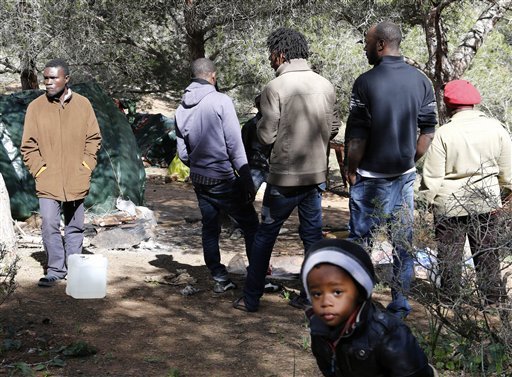
Precious Omoregbe, a 2-year-old with bright eyes, has lived most of her short life in a crude tent made of branches and a plastic tarp. It sits in a refugee camp on the side of a pine-covered mountain overlooking the Mediterranean that her Nigerian parents hoped one day to cross for a new life.
Her mother Happy stays in the camp while her father Osas begs for food in the nearby city of Nador. He and thousands of other migrants from sub-Saharan Africa flock to the city in hopes of finding a way into nearby Melilla, a Spanish city on the North African coast that is seen as a shortcut to Europe.
“She’s doing good, but the way we are living is very hard for my baby,” said Happy Omoregbe, as she scolded her daughter for playing with the stinging caterpillars that infest the ground. “Every day it is very cold and we have to find clothes to wear.”
But Morocco’s tolerance for the tens of thousands of African migrants living within its borders appears to be at an end, as Europe pressures it to crack down. Starting Feb. 10, police began sweeping through camps like this one, burning down tents and deporting migrants to cities in the deep south, far from Europe’s borders. Activists fear it may be a prelude to kicking them out of the country altogether.

Precious’ family is one of many caught in the middle as Morocco struggles for ways to cope with its migrant crisis. The whole Mediterranean region is grappling with waves of refugees fleeing poor and war-torn homes for the wealth of Europe.
Last year, Morocco announced a groundbreaking new approach that would allow illegal immigrants to apply for residency. The flip side is that those whose bids are rejected face a no tolerance policy of camp closures and relocations. More than a thousand immigrants have been caught in the sweep, including many who had applied for legal status, according to activist groups.
“We are stunned by this new reaction, by these attacks that have been carried out over the last few days,” said Abdeslam Amakhtari, the president of a development organization in Nador. “We denounce them and demand the rights of the migrants be respected and they be given a chance to integrate in Moroccan society,”
Amakhtari’s group, Asticude, had initially welcomed the new policy and worked with migrants around Nador, helping them apply for residency and educating them about Moroccan society. But now he says the government’s new sweeps are betraying their promise to help integrate the migrants.
“You can’t have this contradiction between the laws and the practice,” he said referring to the rhetoric of integration and the recent police sweeps.
The organization also receives funds from the Ministry of Migration to buy food and supplies to distribute to the same camps that are now being raided, reinforcing a sense of conflicting policy.
One of the reasons for the inconsistency, Amakhtari said, is that while Morocco finds itself under pressure from Europe to stem the tide of illegal immigrants, it also wants to improve relations with sub-Saharan countries. The new program of legalizing immigrants and even integrating them into society was seen as a way of balancing these priorities.
Just hours before the first police operations began, Moroccan officials announced that of 27,000 residency applications, 18,000 had been granted, with women and children getting automatic acceptance. Those rejected would be allowed to appeal the decision.
“We Moroccans should take pride in this as we transform the nightmares of the immigrants into dreams,” said Minister of Migration Anas Birou at the press conference, explaining how the migrants would be eligible for state education and health care. But the Interior Ministry followed up saying the camps around the Spanish enclaves would be dismantled to “free” the migrants from the clutches of human trafficking mafias.
“I don’t know what mafias they are talking about,” said Victor, a bitter Cameroonian immigrant. Like other migrants quoted in this story, he gave only his first name for fear of ruining his chances of making it to Europe. Victor stood among the ruins of a camp that had just been raided, and had been home to several hundred migrants.
As dusk fell, those who had escaped the morning sweep picked through the rubble of the camp, slowly rebuilding the tents and salvaging what was left of their food and belongings that had been set on fire by the police.
The ground was littered with scraps of tarps, torn bags of rice, shoes and muddy clothes. A mother chased after a child playing in the debris. Some migrants showed the receipts they had been given for their residency applications.
Most of the migrants have spent years making their way to Morocco in hopes of crossing to Europe, then more years living in the forests waiting for their chance. So the thought of giving up and going home is just too much.
“I would prefer to kill myself than go back, I want to be able to dream,” said Joel, also from Cameroon. “With no dreams, there is no hope.”
Farther up the hill, at a camp not yet found by the police, Precious’ family sees a glimmer of hope. Osas has been in Morocco for some six years, sometimes living in the cities, but lately in the woods to avoid paying rent — as he awaited his chance to cross to Melilla.
Fatherhood has made Osas consider staying in Morocco with his family.
“Now I have family, I can’t do that (jump the fence),” he said. “If I can get a good job here, I can put her in a good school.”



